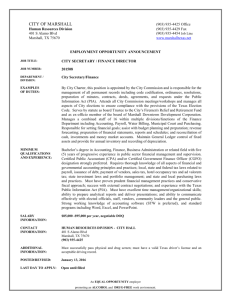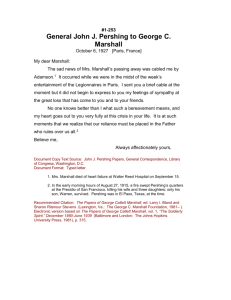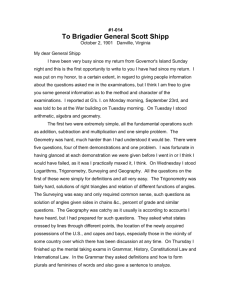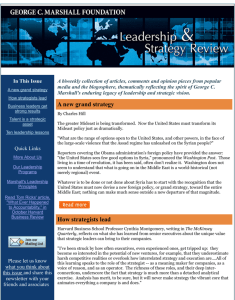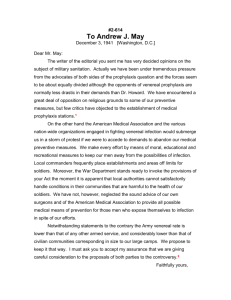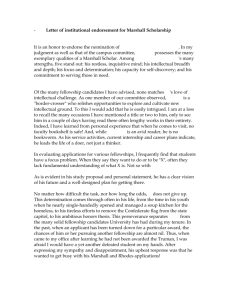June 24, 2014 Frederick W. Smith Chairman and Chief Executive
advertisement
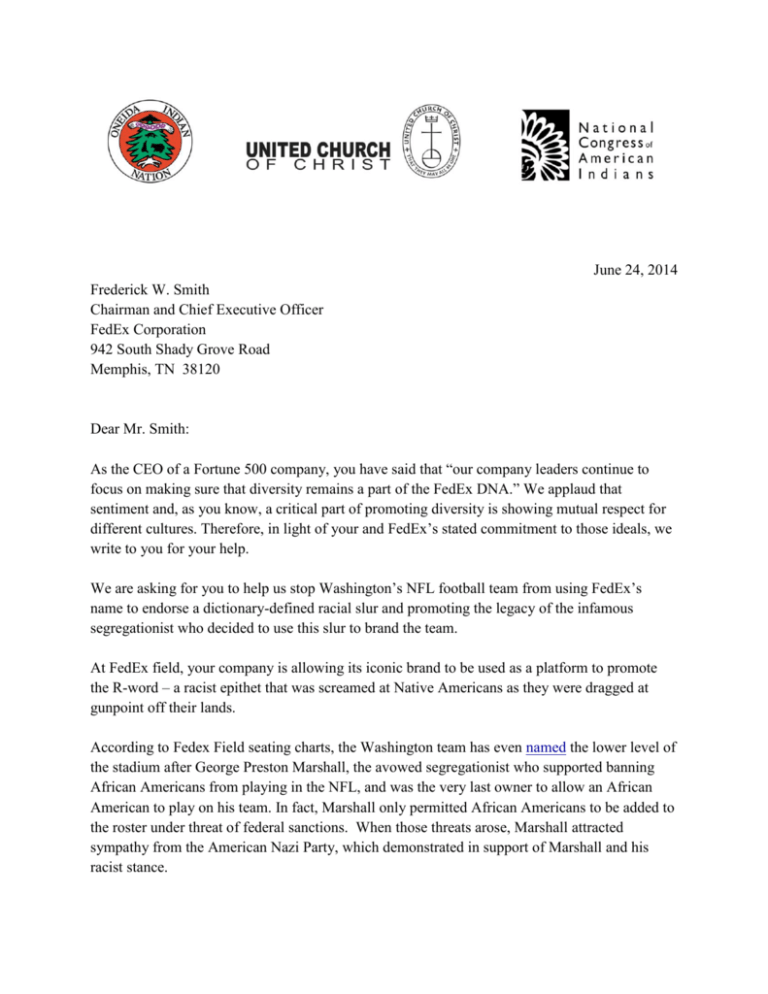
June 24, 2014 Frederick W. Smith Chairman and Chief Executive Officer FedEx Corporation 942 South Shady Grove Road Memphis, TN 38120 Dear Mr. Smith: As the CEO of a Fortune 500 company, you have said that “our company leaders continue to focus on making sure that diversity remains a part of the FedEx DNA.” We applaud that sentiment and, as you know, a critical part of promoting diversity is showing mutual respect for different cultures. Therefore, in light of your and FedEx’s stated commitment to those ideals, we write to you for your help. We are asking for you to help us stop Washington’s NFL football team from using FedEx’s name to endorse a dictionary-defined racial slur and promoting the legacy of the infamous segregationist who decided to use this slur to brand the team. At FedEx field, your company is allowing its iconic brand to be used as a platform to promote the R-word – a racist epithet that was screamed at Native Americans as they were dragged at gunpoint off their lands. According to Fedex Field seating charts, the Washington team has even named the lower level of the stadium after George Preston Marshall, the avowed segregationist who supported banning African Americans from playing in the NFL, and was the very last owner to allow an African American to play on his team. In fact, Marshall only permitted African Americans to be added to the roster under threat of federal sanctions. When those threats arose, Marshall attracted sympathy from the American Nazi Party, which demonstrated in support of Marshall and his racist stance. It is worth noting that the decision to name part of FedEx Field after this segregationist was not merely a holdover from a bygone era. As you and FedEx officials probably recall, the stadium was officially opened in 1997, meaning the decision to name the George Preston Marshall section after this proud racist happened quite recently. Perhaps worse, team officials have chosen for years to use the FedEx-branded stadium to continue honoring Marshall in this way at the very same time they claim they do not intend to offend people of color by promoting and profiting from the R-word racial slur Marshall used as the team’s name. During recent months, officials from Washington’s professional football franchise have repeatedly insisted that the segregationist Marshall intended for the R-word racial slur to be a term of honor for Native Americans. On its face, that is patently absurd - a racial slur is a term of disrespect, not honor. Even if the public were to subscribe to the fantastical myth of the benevolent racist, the words of Marshall himself prove that he did not intend for this slur to honor Native Americans. As Marshall told the Associated Press in 1933, “The fact that we have in our head coach, Lone Star Dietz, an Indian, together with several Indian players, has not, as may be suspected, inspired me to select the name Redskins.” Instead, Marshall told the news organization, he chose the name simply to keep using caricatured Native American iconography while transitioning away from the name Boston Braves. While Native Americans have been objecting for decades to the name of Washington’s NFL team, those efforts have gained historic momentum during the past year in the form of the national, grassroots Change the Mascot campaign. Civil rights organizations, religious leaders, leading retired and active athletes, Members of Congress from both parties and the President of the United States have all spoken out in support of our Change the Mascot campaign to end the promotion of the R-word. Most recently, the U.S. Patent and Trademark Office canceled the team’s trademark registration, concluding that the team’s name and logo are disparaging. Fifty Senators recently wrote to NFL Commissioner Roger Goodell noting that “racism and bigotry have no place in professional sports,” and urging the league to place itself on the right side of history by changing the team’s name. In a diverse region where professional sports are supposed to serve as a unifying force, FedEx’s brand is being leveraged to promote some of the most divisive messages ever conceived - the messages of segregation and hate. Attached to this letter is a brief document that outlines some of the key points related to George Preston Marshall's long history of racism. We sincerely hope that FedEx will not continue to allow your name to be associated with his legacy of segregation and racism. Sincerely, Rev. Dr. John R. Deckenback Conference Minister United Church of Christ Central Atlantic Conference Rev. Graylan Hagler Senior Minister Plymouth Congregational United Church of Christ Jacqueline Pata Executive Director National Congress of American Indians Ray Halbritter Oneida Indian Nation Representative United Church of Christ Central Atlantic Conference 916 S. Rolling Rd, Baltimore, MD 21228 Why is An NFL Team Promoting a Segregationist's Legacy? The Washington football franchise insists its use of a dictionary-defined racial slur as its team name celebrates Native Americans. Yet, a segregationist named George Preston Marshall gave the team that name. The NFL claims to honor Native Americans by using the R-word slur, but in reality it is actually honoring the legacy of an avowed racist and segregationist? MARSHALL PROMOTED SEGREGATION IN HIS WILL: The Daily Beast reported that in the will setting up his foundation, George Preston Marshall included “one firm condition: that the foundation, operating out of Washington, D.C., should not direct a single dollar toward ‘any purpose which supports or employs the principle of racial integration in any form.’” [Source: The Daily Beast, 6/1/13] MARSHALL PROMOTED CONFEDERATE CULTURE: The New York Review of Books reported that "in 1959 - around about the time some Southern states were reintroducing the Confederate stars and bars to their flags - Marshall changed the lyrics of the team song from 'Fight for old D.C.' to 'Fight for old Dixie.'" ESPN reports that Marshall's wife co-authored the song. The New York Times noted that Marshall's "family counted a Confederate flag among its heirlooms." [Source: NY Review of Books, 11/10/11; New York Times, 10/6/12; ESPN] MARSHALL OPPOSED INCLUDINGAFRICAN AMERICAN PLAYERS: The New York Times reports that according to Andy Piascik's book "Gridiron Gauntlet": "In contrast to other N.F.L. owners, Marshall 'did not pretend there were no blacks good enough to make his team. Unlike the others, he was honest enough to admit that he simply didn’t want them around.” [Source: New York Times, 10/6/12] MARSHALL WAS LIKELY AT THE CENTER OF AN NFL BAN ON AFRICAN AMERICAN PLAYERS: The Daily Beast reported that Marshall “probably instigated the banning of black athletes from the NFL from 1933 until 1946.” The magazine noted that while the ban’s major proponent has been a secret, the 2011 book “Showdown: JFK and the Integration of the Washington Redskins” put ”Marshall at the center of the ban” as “Marshall was the biggest racist” among NFL owners at the time. [Source: The Daily Beast, 6/1/13] MARSHALL'S "NEVER" PLEDGE FORESHADOWED DANSNYDER'S: Current Washington owner declared infamously declared that the team would "never" stop using a racial epithet as its name. The comment was eerily reminiscent of Snyder's predecessor's use of the word "never." As Fox Sports has reported, years after the rest of the league had African-American players, Marshall said the NAACP stood for 'Never at Anytime Any Colored Players.'" [Source: Fox Sports, 6/2/14] MARSHALL DID NOT USE THE R-WORD TO HONOR NATIVE AMERICANS: As Marshall himself told the Associated Press in 1933, “The fact that we have in our head coach, Lone Star Dietz, an Indian, together with several Indian players, has not, as may be suspected, inspired me to select the name Redskins.” Instead, Marshall told the news organization he chose the name simply to be able to keep using caricatured Native American iconography and not be confused with the Boston Braves. [Source: Washington Post, 5/28/14] REDSKINS BECAME THE LONE HOLD OUT AGAINST INTEGRATION: The New York Times reports that "Though pro football included 13 black players through the 1920s and early ’30s, the integration of the sport did not truly begin until 1946 when the Los Angeles Rams signed running back Kenny Washington and receiver Woody Strode, and the Cleveland Browns of the All-America Football Conference signed offensive tackle Bill Willis and running back Marion Motley. In 1949, 3 of the 10 N.F.L. teams had black players. By 1955, the Redskins were the lone holdout in the 12-team league." [Source: New York Times, 10/6/12] AS OTHER TEAMS CHANGED, MARSHALL REFUSED TO ACCEPT AFRICAN AMERICANS: ESPN reports that "William Shea and Jack Kent Cooke, members of the Redskins' Board of Directors, urged Marshall to yield" but that "Edward B. Williams, who would become a stockholder in 1962, recalled Marshall saying 'that under no circumstances would he change' his racial policy." [Source: ESPN] MARSHALL ONLY ALLOWED AFRICAN AMERICANS UNDER THREAT OF FEDERAL SANCTIONS: Marshall only begrudgingly accepted integration under threat of a punishment from the federal government. As the New York Times reported, "The Redskins were preparing to move into a new stadium being built on federally controlled land affiliated with the national parks system" and the Kennedy administration's Interior Secretary, Steward Udall, "stipulated that the Redskins could use the stadium only if they followed federal laws (which) meant not applying hiring discrimination." Marshall first sniped at the demand, saying “I didn’t know the government had the right to tell a showman how to cast the play." But he then agreed when NFL officials feared his intransigence would lose the league its first television contract. [Source: New York Times, 10/6/12]

